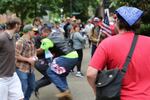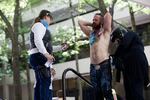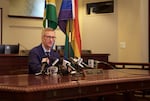Portland Mayor Ted Wheeler is introducing a controversial ordinance Thursday that would give him the power to dictate the location and length of protests if he fears they pose a threat to public safety.
The ordinance could go to a vote next week.
Wheeler said the ordinance is a response to escalating violence between opposing protesters in Portland’s streets — and to the criticism and negative headlines that follow each brawl.
“Just last week NBC Nightly News ran a 60-minute piece, and during the entire 60 minutes, it just showed people beating the bejesus out of each other on the streets of our city,” Wheeler said in an interview Wednesday. “The implied question is: Where the heck is the mayor and where the heck is the police chief in trying to prevent this kind of thing from happening?”

In 2017, Tusitala “Tiny” Toese, center, a known member of the militia style group, the Oath Keepers, was photographed tackling an Antifa protester before federal law enforcement officers detained the protester and arrested him.
Bryan M. Vance / OPB
Though the mayor generally avoids mentioning the groups by name, the ordinance is a response to two years of protests, counter-protests, and occasional brawls between the groups Patriot Prayer and Antifa.
Portland Police Chief Danielle Outlaw said she asked the mayor for "new tools" to deal with protesters after an Aug. 4 march in Portland that drew right-wing extremist groups from across the country and was dubbed "the next Charlottesville" by national media.
The Portland police largely succeeded at preventing violence between armed right-wing extremists and counter-protesters, including Antifa, but the event ended with a self-inflicted disaster.
Officers fired less-lethal weapons into the crowd of counter-protesters. Several people suffered injuries, including chemical burns and a serious head injury that led one person to be hospitalized. The Independent Police Review is still investigating the incident.

A protester drips with milk, commonly used to wash out pepper spray.
Ericka Cruz Guevarra / OPB
Outlaw described the current dynamic on Portland’s streets as an unwinnable situation for Portland police, who are often outnumbered by the protesters they are trying to keep separate.
“We don’t have the advantage of being surrounded by other mid– to large-size police departments that can give us additional officers to increase our presence and lessen the likelihood of us using force,” she said.
Wheeler and Outlaw claim that the new ordinance would make it easier for the city to prevent protests from turning violent by giving the mayor the power to require that groups with a past history of violence protest in separate places.
“If somebody on social media calls out another group and says 'I am going to commit acts of violence against you in downtown Portland, Oregon,' we could separate those two groups, notify them in advance and enforce that separation,” he said.
In fact, the ordinance gives the mayor much broader powers than he claims.
Related: Portland Mayor Proposes Fast Track Regulations For Public Protests
The mayor could also invoke his power to regulate the time and length of any protest if he or the Police Bureau believe there is “a substantial likelihood” of violence, or if the safety of participants is threatened.
Critics say the ordinance would undermine Portland’s reputation as a city that cherishes civic engagement and free speech, and is likely unconstitutional.
“There are reasonable, legal solutions to address violence on the streets — this ordinance is not one of them,” said Mat Dos Santos, legal director of the ACLU of Oregon.
“The ordinance hands law enforcement and the mayor far too much power and risks undermining people's ability to practice their constitutionally-protected right to speech and assembly.”
Independent legal experts also question whether the ordinance is constitutional.
Lewis and Clark law professor Jim Oleske said the Supreme Court has held that the government cannot restrict the marches of a repugnant group like the Ku Klux Klan based on the likelihood of violent counter-protests.
"You'd be allowing what's called a heckler's veto," said Oleske. "You'd be allowing unpopular speech to get shut down by the government because of hostile audience reaction."
Oleske said the section of the mayor's ordinance that proposes regulating protests involving two groups with a proven history of violence is more likely to be upheld in the case of a legal challenge. The parts of the ordinance that give the mayor broader powers to regulate protests with the potential to become violent is more vulnerable to a challenge.
The mayor, in an effort to underscore the urgency of the problem, introduced the ordinance as an emergency measure — meaning the council could vote on it Wednesday, and it would take effect immediately.

Portland Mayor Ted Wheeler speaks at a monthly press conference Oct. 12, 2018.
Ericka Cruz Guevarra / OPB
But other members of the council have made it clear that won't happen: Passing an emergency measure requires a unanimous vote from the council.
Commissioners Chloe Eudaly and Amanda Fritz have signaled they will likely oppose the measure.
Commissioner Nick Fish has said the emergency clause will be dropped from the ordinance, meaning it will move to a second reading and a vote by the council next week.
Commissioner Dan Saltzman has said he will support it. Fish is the likely swing vote.
Fish has declined interview requests in advance of the council hearing on the ordinance, but in a written statement, he left the door open to the mayor earning his support.
“It’s possible that we need another tool in our toolkit to ensure safety in our public spaces. And time, place, manner regulations may be the right approach,” he said. “I look forward to a broader discussion with my colleagues and key stakeholders before we take any further action.”
If the ordinance does pass, Wheeler expects the ACLU to sue the city over it.
“The ACLU can’t wait. They’re chomping a the bit,” he said. “I fully expect it to get challenged.”
Wheeler said he believes the ordinance is “rock solid” and constitutional, citing legal precedent that allows cities to limit speech and assembly in some ways in cases where public safety is threatened.
But Portland has an unimpressive track record when it comes to defending city code that limits free speech.
In 2015, a federal judge ruled that the city could no longer exclude activists from future City Council meetings based on their past history of disruptive behavior.
Two city attorneys argued that the restrictions on free speech were reasonable, due in part to public safety concerns.
Local activist Joe Walsh, 73, represented himself in the case. He argued that the city’s practice violated his right to free speech, and won.

